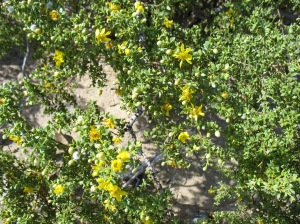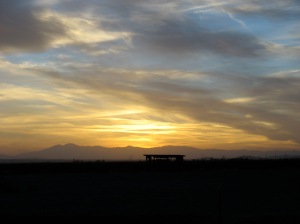Winter has worn the homestead down. Scouring winds have taken their toll on the remnants of last year’s garden, and plummeting night-time temperatures have finished off what the winds alone couldn’t reach. Bare ground, greasewood, salt bushes, weeds, and a few impertinent belly flowers have done well, wrenching any drop of moisture into greenery and blossoms, and the rocks have also held their own. Sands have done some moving and realigning, as have a number of insect and animal colonies: ants, beetles, even packrats. In some areas, the land is hardpacked, resembling a clay for long stretches, concrete in others.
Jackrabbits, ravens, doves, and bats still rely on us for a few morsels a day, and they stop in to check out what we or our domesticated pack have overlooked, but the wind and the sun are prone to empty the water dishes I fill and leave out for the wild ones on purpose. The coyotes still check us out, but haven’t managed to get back into the coops, so our numbers are holding steady for now.
Two days ago, though, a tiny songbird alighted in the yellow-flowering creosote bush near our back door. The trill brought sleepy me to my feet. They are back! Every year they return. Yesterday there were more, and today? They cannot be counted or named. The skies are alive with their songs, and the whole place seems to quicken, too, as it serves up what they need for the next leg of their journeys. Even the hardpan areas, I noticed this morning, are beginning to hold onto detritus, the start of more soil, and soon we will be able to move from saved seeds and seed cataloguing (a major winter activity) to the ground once more. The next solstice is coming soon, and I remembered it this year—as ever—by the arrival of the songbirds.
We’re at a moment in human history where the citizens of industrialized nations are telling ourselves outsized stories of destruction and loss, of the end of the planet as we know it. I’ve told some of those myself as I watch us continue our ways, hardheaded and stubborn about it, even though we know these ways are not good for us or the earth. People like us, of course, are responsible for most of the destruction, and many of our tales are geared to getting us to rethink our givens and choose other, less destructive, less consumptive ways of being here. Maybe that is why tales of a dying planet are so common now. Perhaps, however, we’d rather talk about it than do anything that would require us to live with less than whatever we’ve wrested to ourselves and thus believe we have a right to hold? Given our intransigences, I wonder if these ballads of Armageddon and planetary collapse are simply the latest opiate of choice?
Opiates of any ilk, of course, hold humans in a self-created delusional maw from which escape can seem well-nigh impossible. Inconceivable, even. Storied opiates may be the most effective of all, because they can feed our lust for telling the heroic paths just ahead, with a slip of self-effacement to elide our full collusion with the destruction we are meting out now. Some of us are suffering far more than others already and we know this—know it well—but this, too, is a choice. A whole set of choices.
In an effort to limit our own impacts, we have taken life down to its bone and marrow here on this wind-seared patch of desert ground. We attend to every drop of water (I kid you not), wring as much out of as little as we can on purpose, drive and consume and travel as little as possible, sharply limit our usage of conveniences like air-conditioning, and share whatever we can with others (both people and animals). We don’t buy things from places that don’t pay livable wages, either, which means we do without quite a lot anymore. Eating local is a real challenge here, but we do our best, constantly conniving to find plants that might handle our winter (or the other three, equally hard seasons) and still produce food, supporting our local farms, limiting our menus, and getting the rest from places that at least make an effort not to exploit workers anywhere along the chain. We’d like to be all-out locavores, but will have to become far more savvy about plants and deserts for that. Still, these are our efforts and, while they are not enough, they feel better to me than daily waste and using more than we need and having so much while others have so little. Maybe these are my opiates? I don’t know.
I do know that I no longer look at the planet with anything approaching fear or dread. On occasion, I feel sadness for her many creatures that are being ill-served right now. Whales and other sea life pummeled by oil spills, Naval bombings, trash; butterflies and bees dying off from pesticides; so, so many creatures being killed for food or sport; the very stuff of life (plants and seeds) being engineered for death-dealing hocked to us as “progress,” and sometimes I can get entirely lost in grieving all that. Sometimes I look at the songbirds and start to think in that rut—Oh, what will happen to them? But then I look, I mean, I really look and listen, and they say what the planet is saying: We shall abide. Your kind may opt not to be here alongside us; you may go on your merry ways telling your sad and self-created tales of woe and destruction while doing more to ensure it every day; you may kill, maim, and destroy to your very last breaths, yes; you may, indeed, participate in shifting the climate and weather and growing seasons; you are human beings and you have shown habits of destruction on purpose and you are not likely to quit now. But do not grieve us. We shall abide.
One unexpected effect of the opiates, the Armageddon tales and the nearly crazed consumptive behaviors now being embraced by so many in this society? Is a deep settling down to the rock bottom of existence. A single songbird is all that some moments are about for me anymore. Hard-pan with a single belly flower—not 1/32nd of an inch from side to side, and standing not one quarter of an inch from the ground from which it has emerged. Bright yellow blossoms loading down the creosote 15 feet from where the drops of water from our sink are set free deep under the sand. There’s a handbuilt reservoir there, part of our rickety efforts to ensure that all water serves as many as possible here, but we are chintzy on water usage in the house and not much goes into it. The creosotes don’t know or care about our environmentally sustainable goals: they reach for the water and drink when they can, putting on blossoms that will become seeds that will abide long after we are gone.
It’s this that is the great joy for me. Amidst all the destruction, all the handwringing and yet do-littling that is afoot? Rests forever. This now. The song of a bird bound for somewhere else. The sight of a teensy flower, living out its life when given half a chance or less. The ants, gamely moving house when I bring tidbits out for them to savor. The packrats tunneling under whatever can be found, picking up lost seeds and bright shiny objects that the humans either discarded or forgot or never had or never noticed, items from which a fine home can be made. The creosotes gleaming green and yellow on literally drops of water per day. In the lee of our destruction, all these creatures live and make do and, when I listen, I mean, really listen, I can hear forever in their wake: We shall abide.


